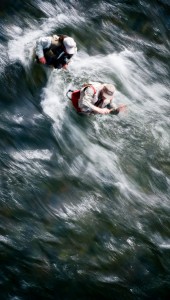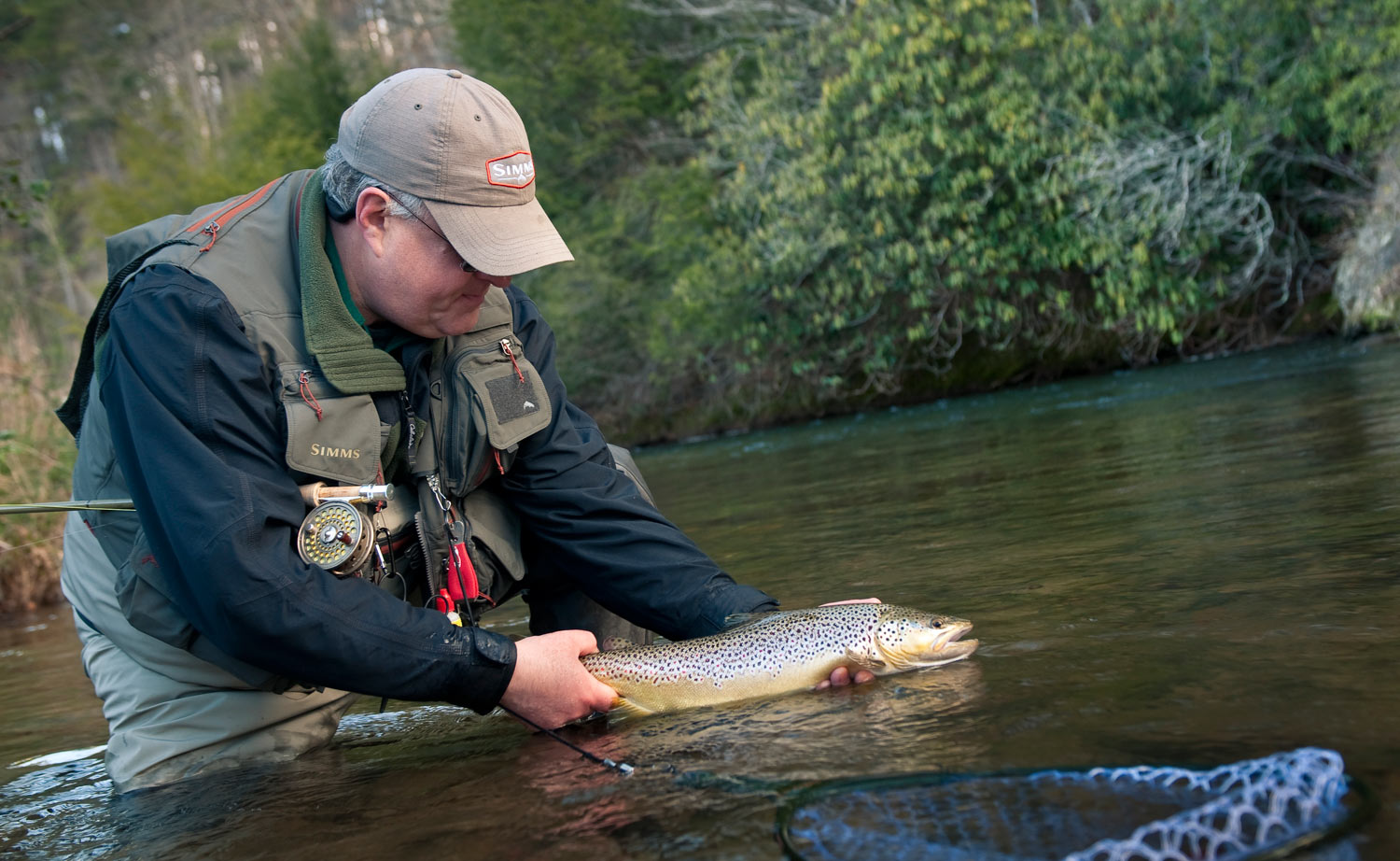By Louis Cahill
Does landing fish stress you out?
I got an email the other day from a reader asking what he should do with his rod when landing a fish. He was worked up and clearly struggling. I could see the scene in my head and I knew the answer wasn’t what he should do with his rod, but that he should just relax.
I see a lot of guys struggle with landing and unhooking fish. The first piece of advice I offer is, relax. Once the fish is in the net, you can let him hang out there (fully submerged) while you get yourself together. This little rest period is actually good for the fish.
Way too many anglers get stressed out and end up doing harm to their fish and sometimes themselves. There’s no need to squeeze fish or hold them awkwardly out of the water while wrestling with a hook in fast current. Just relax before someone gets hurt. I’ve seen guys take a swim or get a hook in their hand past the barb that way.
What I do with my rod is, point the tip of the rod behind me and tuck it under my arm so the cork rests high in my arm pit and the reel is sticking out just at my chest. That gives a pretty good range of motion while still hanging onto the rod.
Make sure you have enough line out to give you a little slack. You don’t want the tip of the rod bent by the line and you don’t want ten feet of line wrapped around your feet either. That’s a good way to break a rod.
Every situation is different. It’s pretty simple to land and release a common trout midstream without losing your rod or taking a swim, but if things are complicated in any way, it’s best to head for calm water. If the hook is giving you trouble or you’re in a tough wading spot or you’re just struggling for any reason, simplify the situation by getting into soft water.
Of course the best case scenario is that your fish is just too big to fit in your net.
 One of the most important aspects of fighting big fish is choosing the spot where you will land that fish. After all, you are in his environment, you need to do all you can to stack the odds in your favor. You might need to be standing in fast current to make the best presentation, but that’s not where you want to try and net a twenty-plus inch fish.
One of the most important aspects of fighting big fish is choosing the spot where you will land that fish. After all, you are in his environment, you need to do all you can to stack the odds in your favor. You might need to be standing in fast current to make the best presentation, but that’s not where you want to try and net a twenty-plus inch fish.
As you fight that fish, work your way into a nearby spot where the water is soft and shallow. Preferably about mid-calf. I carry a large net with a rubber basket, and once I have the fish in it, I’ll tuck the rod under my arm and kneel down so I can remove the hook as the fish rests naturally in the water. This keeps them relaxed and lets me get about the business of removing the hook and securing my rig without an argument.
Once you’re in soft water you have a lot of options for dealing with your rod. You can set it on the bank or even put it in the water. Just keep up with it so you or your buddy won’t kneel or step on it. You can even hand it to your buddy.
I like fishing barbless hooks and I carry a catch and release tool to make removing the hook super simple. Just stay calm and everything should go smoothly. There’s no need to let landing a fish stress you out. That’s not why we go fly fishing.
Louis Cahill Gink & Gasoline www.ginkandgasoline.com hookups@ginkandgasoline.com Sign Up For Our Weekly Newsletter!


I use a “Smith Creek” rod holder, which pins onto your vest/waders/jacket etc and holds the rod securely in a neat soft rubber grip , leaving your hands free to hold a fish/tie on a fresh fly. A great piece of kit. Works anywhere you want a “third hand” to hold your rod.
Sometimes when I have fish that continue to thrash after landing them I’ll flip them upside down to start the hook removal process. It disorients them and they stop moving, and buys you time to get the hook out without them thrashing more. This makes for a quicker/safer release.
Very good advice. I have watched many buddies get way way way too worked up over the fight and lose the fish. Obviously this is something we all struggle with unless you’re a master fly fisherman or something(I for one am definitely not). But fishing for “steelhead” in the Erie tribs has helped me a great deal with staying calm when hooking into a giant trout.